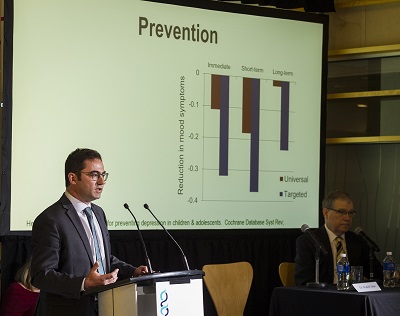A new research project led by researchers in ∫⁄¡œ≥‘πœÕ¯‚Äôs Department of Psychiatry will explore the genetic factors that play a role in bipolar disorder (BD). Dr. Martin Alda and Dr. Rudolf Uher say their work could lead to new clinical tools to better diagnose and treat the disease.
BD is a serious, chronic psychiatric illness that affects young people in their early 20s and recurs throughout their lifetime. It affects an estimated 500,000 Canadians and is one of the top 10 causes of disability and mortality worldwide. Genetic factors influence who is at risk from BD and how individuals respond to long-term treatment.
The three-year, $975,000 research project was unveiled during a joint announcement and panel discussion event hosted by at Dalhousie’s Life Sciences Research Institute (LSRI).
The study will use genomics to develop new screening tools for early detection and identify the best long-term treatment for individual patients, rather than relying on a “one size fits all” approach. Ultimately, Drs. Alda and Uher hope to engage clinicians and patients in the individualized management of BD, based on new treatment guidelines informed by this work.
 ‚ÄúTreating BD with long-term medication can be effective,‚Äù said Dr. Alda, the Killam Chair in Mood Disorders at ∫⁄¡œ≥‘πœÕ¯ and a clinical psychiatrist and researcher with the Nova Scotia Health Authority (NSHA). ‚ÄúHowever, no two individuals are alike and choosing which treatments work best for individuals can take months and even years of trial and error. With the right genetic screening tools, we can more accurately predict which treatments are most likely to work for certain individuals, allowing us to prescribe the right treatment more quickly.‚Äù
‚ÄúTreating BD with long-term medication can be effective,‚Äù said Dr. Alda, the Killam Chair in Mood Disorders at ∫⁄¡œ≥‘πœÕ¯ and a clinical psychiatrist and researcher with the Nova Scotia Health Authority (NSHA). ‚ÄúHowever, no two individuals are alike and choosing which treatments work best for individuals can take months and even years of trial and error. With the right genetic screening tools, we can more accurately predict which treatments are most likely to work for certain individuals, allowing us to prescribe the right treatment more quickly.‚Äù
Genomics should also allow clinicians to more quickly pinpoint people at risk of developing BD.
“We know that genes play a major role in predispositions,” said Dr. Alda. “We should be able to identify people who carry a specifically high risk of becoming affected later in life – people with a family history of bipolar disorder.”
Dr. Uher also stressed the importance of an early diagnosis, given that the risk of suicide in individuals with BD is highest in the first years of the illness – a time when treatment delays can occur.
‚ÄúBy identifying susceptible individuals, we can implement preventive strategies before the onset of symptoms,‚Äù said Dr. Uher, the Canada Research Chair in Early Intervention in psychiatry at ∫⁄¡œ≥‘πœÕ¯ and a clinical psychiatrist and researcher with the NSHA. ‚ÄúTimely diagnosis is critical for decreasing morbidity and mortality.‚Äù
A patient's perspective
Following a reception in the McNamara Boardroom of the LSRI, the event got underway with short speeches from Dr. Steve Armstrong, President & CEO, Genome Atlantic; Janet Knox, President & CEO, NSHA; and Dr. Colin Dodds, Trustee, Research Nova Scotia Trust.
Dr. Armstrong spoke to the timing of the funding announcement, which took place a week after and its focus on “awareness, compassion and understanding” of issues related to mental illness.
“It’s a wonderful segue to move from that into trying to optimize diagnosis and treatment.”
Moderator Cynthia Maillet, a former broadcaster with CBC and Radio-Canada, then took the stage along with Drs. Alda and Uher and Johanna Begin, a patient of both Dr. Alda’s and Dr. Uher’s program, to commence the panel discussion portion of the evening.
“ It has been a long and sometimes arduous journey to get to where I am standing today,” said Begin. “My children and I have been able to incorporate into our lives the tools given to us by the Mood Disorders Clinic and FORBOW. This is a lifelong learning process, and it is because of these tools that we can create areas of a healthy and balanced life.
It has been a long and sometimes arduous journey to get to where I am standing today,” said Begin. “My children and I have been able to incorporate into our lives the tools given to us by the Mood Disorders Clinic and FORBOW. This is a lifelong learning process, and it is because of these tools that we can create areas of a healthy and balanced life.
“I’m delighted that with the ongoing research done by the Mood Disorders Clinic and FORBOW, we can continue to help ourselves and our children. We are fortunate that we’ve had the opportunity to work with these wonderful doctors. I’ve learned so much about different aspects of mental illnesses. It feels wonderful to know that because of their commitment and funding, we will be able to continue to do so.”
“A collective investment”
Genome Atlantic is a not-for-profit corporation whose mission is to help Atlantic Canada reap the economic and social benefits of genomics.
Dr. Armstrong described the project as “a collective investment” that will allow its partners to “maintain a leadership position” in the competitive genetics and genomics space.
Early detection of bipolar disorder and optimized selection of long-term treatment is supported by Genome Atlantic with funding provided from the , the , , the , the and Dr. Uher’s .
For more information about the research project, please read Genome Atlantic's .

